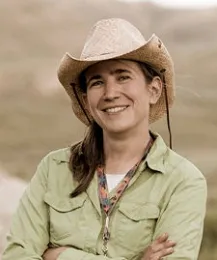
Her presentation, hosted by Emily Meineke, assistant professor of urban landscape entomology, begins at 4:10 on Wednesday, April 28. Access the one-hour seminar via this Zoom link.
In her abstract, Currano says: "Fossil leaves preserve the scars of insect-feeding damage, allowing paleontologists to investigate plant-insect interactions deep in Earth's past. My research on 21-million-year-old fossils from Ethiopia and 59-to-52- million-year-old fossils from Wyoming demonstrates that the diversity and intensity of insect feeding on leaves is affected by both climate and plant nitrogen concentration."
Currano, an associate professor of paleobotany, uses fossil plants to investigate the response of ancient forest ecosystems to environmental perturbations. "Specifically," she asks on her website, "how did environmental changes affect taxonomic diversity, ecosystem structure, plant-insect interactions, and biogeographic patterns? By understanding how ecosystems reacted to past changes, we can better predict how modern ecosystems will respond to anthropogenic changes like CO2-induced global warming. The research conducted in my lab is field-based, specimen-based, and collaborative."
Her current research focuses on 1) biotic response to climate changes during the hothouse Paleogene in the Western United States, particularly Wyoming, 2) the evolution of East African terrestrial ecosystems over the last 30 million years, and 3) the use of fossil plants to reconstruct paleoclimate and paleoenvironment.
Currano holds a bachelor of science degree (2003) from the University of Chicago and a doctorate (2008) from Pennsylvania State University.
Currano and Lexi Jamieson Marsh (founder and director of On Your Feet Entertainment) co-founded The Bearded Lady Project: Challenging the Face of Science, a documentary film and photography project that "investigates our stereotypes of what a field scientist looks like."
The mission of The Bearded Lady Project: Challenging the Face of Science, is twofold: "First, to celebrate the inspirational and adventurous women who choose to dedicate their lives in the search of clues to the history of life on earth," they write on their website. "And second, to educate the public on the inequities and prejudices that exist in the field of science, with special emphasis on the geosciences." Their documentary meshes art with science. They have also set up a scholarship fund to support future female paleontologists. (See paleosoc.org)
Cooperative Extension specialist Ian Grettenberger coordinates the weekly UC Davis Department of Entomology and Nematology seminars. For technical issues, he may be reached at imgrettenberger@ucdavis.edu

